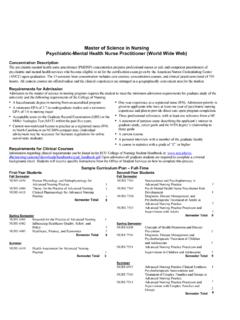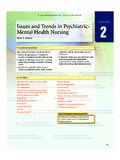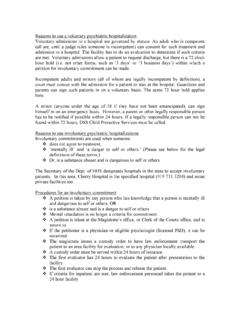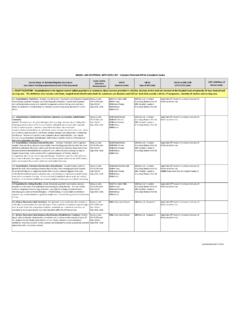Transcription of Psychiatric Patients in the Emergency Department: The ...
1 March 201022 Psychiatric Patients in the Emergency Department: The Dilemma of Extended Lengths of StayAnne Manton, RN, PhD, PMHNP-BC, FAEN, FAANSee if this sounds familiar to We are now boarding Psychiatric Patients in our Emergency department for more than two days because there is no place to transfer them. They receive minimal medical care and no Psychiatric care during that time. This is a quote found in the American College of Emergency Physicians National Report Card on the State of Emergency Medicine Overview (2008). It has been documented in numerous places that the number of Psychiatric Patients seen in Emergency departments has increased markedly during the past decade. A couple of years ago, the nation was shocked by the videotape of a woman in a New York Hospital who died while waiting for admission to a Psychiatric unit and whose death went unnoticed for many hours.
2 While the circumstances surrounding her death may represent the extreme of delays in mental health care, an ACEP 2008 survey found that more than 60 percent of Psychiatric Patients needing admission to a hospital have to stay in the Emergency department more than four hours after a decision has been made to admit them. The survey found that many still are in the Emergency department more than 24 hours after the decision to admit has been made. According to the report, this is a problem that has been increasing for a number of years. One of the precipitating factors in the continuing upsurge in the number of Psychiatric Patients seeking care in the Emergency department is budget cuts at the state and federal levels related to care of the mentally ill, especially cuts in Medicaid. In many areas of the country, Psychiatric inpatient beds are decreasing and alternate community resources are not available.
3 A recent study by the University of Pennsylvania School of Medicine found that two-thirds of Psychiatric Patients who are referred to Psychiatric services in the community following their discharge from the Emergency department are likely to reach only an answering machine, and only about one-third of Medicaid Patients were eventually able to make an appointment. Many were referred back to the Emergency department for care. It is clear that increased length of stay of Psychiatric Patients has an impact on the overall crowding conditions of the Emergency depart-ment affecting the timeliness of care for Psychiatric and non- Psychiatric Patients alike. As Emergency nurses we are all too familiar with the effects of crowding on Patients , families and Emergency department staff who experience the stresses of a crowded Emergency department.
4 But what of the effects of an active, stressful and sometimes chaotic Emergency department on the Psychiatric patient who is in this environment for hours upon hours? Some Emergency departments have dedicated areas for Psychiatric Patients , but according to the 2008 ACEP survey, of those responding, 60 percent said that they did not have an area specifi cally dedicated for Psychiatric Patients . Imagine what it must be like to be sitting (often alone) for many hours in the midst of a busy ED especially if you are seriously depressed, hopeless, anxious or out of touch with reality and, even worse, imagine all this if you are a child, as is so often the case with long ED stays for Psychiatric Patients . It is well known that for Psychiatric Patients , a therapeutic milieu is just the opposite of what exists in the Emergency department.
5 Dr. David Mendelson, the principal author of the 2008 ACEP survey is quoted as saying, While these Patients are being boarded, their care rarely involves a Psychiatric specialist. The environ-ment of a busy Emergency department may function to exacerbate their symptoms, often requiring them to be sedated, rather than providing the specifi c care they need. Dr. Linda Lawrence, ACEP s 2008 president adds, People with Psychiatric emergencies have nowhere else to turn, and they are suffering. The harmful delays that they experi-ence in the Emergency department compound the delays that everyone else experiences as well. (ACEP press release 6/18/08) Current Massachusetts ENA President Laura Raymond, RN, is the Patient Care director at Good Samaritan Medical Center in Brockton, Massachusetts.
6 In this position, Raymond and the Emergency department staff recognized the many needs of Psychiatric Patients and sought to develop a process to meet those needs consistently. They developed a form outlining the protocol for the care of Psychiatric patient care, which is initiated once the decision is made that the patient needs to be admitted to an inpatient Psychiatric unit. This form, which is specifi c to the care of boarding Psychiatric Patients , is then added to the ongoing documentation. Medical problems, if present, continue to be addressed. According to Raymond, the intent is to be proactive rather than wait for escalation to occur. We try to keep people on an even keel, she states. The elements on the form serve as a reminder to the nurse caring for the patient and include areas for documentation of meeting the patient s needs, for example in the areas of hygiene and nutrition.
7 In addition to the nursing form, there is a pre-printed order set that can be customized as needed. Medication sheets are printed based on the medication reconciliation process, which become part of the patient s chart. This helps to ensure that the medications the patient usually takes to manage his or her illness are given and on time. This, too, helps to avoid decompensation or the emergence of symptoms in Patients who have been on Psychiatric medications for some time. Patients who smoke are given nicotine patches if they desire. Attention also is given to diversionary activities, including television, newspapers, drawing supplies, playing cards and even checkers on is the case at so many hospitals, the Emergency department at Good Samaritan Medical Center does not have a dedicated area for Psychiatric Patients , but according to Raymond, it tends to use one section of the Emergency department when possible.
8 This is especially true at night when lights are turned down, and activity in that area is kept to a minimum in an attempt to allow Psychiatric Patients to get a reasonable night s sleep. Sitters are used to monitor Patients during this time. Psychiatric Patients must be reevaluated by the physician at least every 24 hours, or more frequently if our discussion, Raymond wants to convey to Emergency nurses everywhere who care for Psychiatric Patients how important it is to be compassionate and respectful. She urges Emergency nurses caring for Psychiatric Patients to read their stories, learn about them as people before making judgments. It can make a real difference. As an Emergency nurse whose concern for the care of Psychiatric Patients in the ED led to my becoming a Psychiatric mental health nurse practitioner, I can echo her words of wisdom.
9 For some Psychiatric Patients , the ED is the only place they can turn to receive care. It is our responsibility to ensure that the care they receive is the best care possible in every respect.





